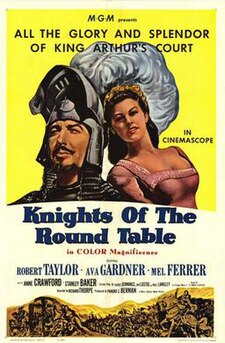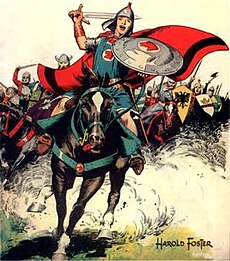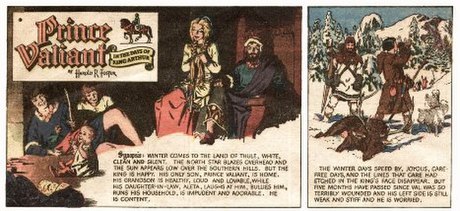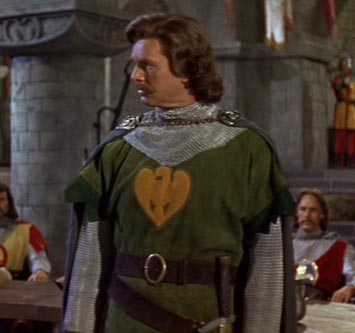The first event were the witch hunts of "The House Committee on Un-American Activities". The committee's activities created an environment in the film industry that led to the "Black Listing" of alleged and actual members of the Communist Party. Even though joining that party was commond during the Second World War as the Soviet Union was our ally. This forced the major and minor studios and actors to look for "acceptable" work that indicated they were loyal Americans. For a look at the affect on members of the motion picture industry read my article on screen writer and novelist Guy Endore:
https://kinescopedreams.blogspot.com/2015/12/guy-endore-communism-in-motion-picture.html
The second event was that prior to the Second World War American film studios had placed funds in British Banks that became frozen when the war broke out. These funds gathered interest, but after the war ended the studios discovered that to remove them. They would have to pay taxes in both England and the United States. So their answer was to bring American stars and some directors to the United Kingdom and shoot motion pictures there.
Filming in England started a trend in movies made in the U.K. and the United States I mentioned in my first paragraph. Three of the most successful were 1952's "Ivanhoe" based upon Sir Walter Scott's novel and starring Robert Taylor, the non-related Elizabeth Taylor, Joan Fontaine and George Sanders.

1953's "Knights of the Round Table" once more starring Robert Taylor with Ava Gardner and Mel Ferrer and---

1954's "King Richard and the Crusaders" aka: "The Talisman". Also based upon a novel by Sir Walter Scott and starring Rex Harrison, Virginia Mayo, George Sanders and a young Lawrence Harvey.

1954 also produced three motion pictures three actors would soon have forgotten that like the other three above I saw as a young boy in Los Angeles. It must be remembered that at this time very few actors had a choice of what they appeared in and were considered "Contract Players".
Before he married Natalie Wood in 1957 and decades before he played Tony DiNozzo's father on the original television series "NCIS". Robert Wagner was "Prince Valiant".
In 1937 newspaper comic strip artist and writer Hal Foster created "Prince Valiant" about a Viking Prince who becomes a member of the Round Table. The actual title of this still running strip is: "Prince Valiant in the Days of King Arthur" and is considered one of the most impressive comic strips ever made. Like many American's I read it in the Sunday papers.


So it made sense to turn the strip into a motion picture. Note on the following poster for the picture the line: "You see it without glasses in CinemaScope". The film was released during the 3-D craze and CinemaScope was just coming out as a format in competition. Today we don't even think of a widescreen process as special.

The motion picture was directed by Henry Hathaway and starred, as the poster shows, some major 20th Century Fox contract players beside Wagner. Like Robert Wagner actor Sterling Hayden also wanted this movie to go away.
The story tells of the exile of Prince Valiant and his father, because they are Christian, from the Viking land they rule. Valiant's father comes to England with his son and the two are protected by King Arthur. When Valiant has grown to the proper age. He is sent to Camelot to become a squire and eventually a knight.
Sir Brack, James Mason, wants to train Valiant, but Arthur assigns him to the family friend Sir Gwain, Sterling Hayden. Unknown to everyone is that Sir Brack as "The Black Knight" is in league with Sligon, played by wrestler Primo Carnera, who drove Valiant and his father from their Viking homeland.
Meanwhile Prince Valiant has fallen in love with Princess Aleta, Janet Lee. Whose father is against the relationship, because Valiant is a Viking by birth. Additionally Aleta's sister Llene, Debra Paget, is in love with Sir Gwain. However, Aleta's father offers her to Gwain.
Valiant discovers the truth about Sir Brack, but no one of course believes him. Meanwhile Sligon attacks the castle and with the help of other Christian Vikings led by Valiant's friend Boltar, Victor McLagen. The attackers are stopped and Valiant kills Sligon.
Valiant accuses Sir Brack of being in league with Sligon and Brack in turn challenges him to duel and is killed, Valiant gets Aleta as Gwain has fallen in love with Elene. To complete the happy ending King Arthur knights Prince Valiant as a member of the Round Table.
One of the main reasons Robert Wagner may not have wanted to remember this motion picture is his hair. The producers were faithful to the comic strip look and Wagner wore one weird looking hairstyle.
Sterling Hayden did a letter better with the hair styling.

Lead actor James Mason came out the best. Probably do to his star power.
The second motion picture from 1954 was actually filmed in England, and the only one of the three this article is about. This feature starred an unusual actor for King Arthur's court. Among his others other work were 1942's "This Gun for Hire", in 1946 "Two Years Before the Mast", "The Blue Dahlia" and "O.S.S." and two years before this motion picture. He played the title role in George Stevens' classic Western "Shane". In fact he was even seen at the end of "Citizen Kane" as a reporter smoking a pipe. Of course I am talking about Alan Ladd.
This movie was "The Black Knight" co-starring Patrica Medina. It also featured a pre-Dr. Frankenstein Peter Cushing and a pre-Second Dr. Who Patrick Troughton. The motion picture was co-produced by American Albert R, Brocolli eight years before he cast Sean Connery as James Bond in "Dr. No".

As plot goes, if the fact that Columbia Pictures didn't have money tied up in England the film would never have been made. Simply put Alan Ladd is a commoner blacksmith in love with the Lady Linet portrayed by Patricia Medina. The blacksmith creates the secret identity of "The Black Knight" to win her. As "The Black Knight" he is able to help King Arthur against both the Saracens and Cornishmen. Who work together disguised as Vikings, following here, and attack Camelot to dethrone Arthur and take over England. "The Black Knight" saves the day and wins his Lady love. End credits roll.
Alan Ladd and Patricia Medina
Peter Cushing as Sir Palamides

Note that Ladd's "Black Knight" wasn't that black in look.
The behind the scenes soap opera explains why Alan Ladd wanted to forget this motion picture.
Half-way through production British screenwriter/director and producer Bryan Forbes was called in for rewrites. He relates in his memoirs "A Divided Life" this hilarious run in with Ladd's wife Sue. She had complete script approval for her husband. Forbes wanted to do a scene were her husband's character steals a horse he needs.
According to Forbes Sue Ladd replied:
Alan Ladd does not steal a horse, period. I'm telling you. He steals a horse, we lose the Boy Scouts Association and the Daughters of the American Revolution, to say nothing of his fan club.Irving Allen the senior producer replied to Mrs. Ladd:
He's not stealing a horse, Sue, he's borrowing a horse. You know like a Hertz car.Mrs. Ladd next stated:
So, show me the difference. You keep the stolen horse in and you start looking for another star.Bryan Forbes then added:
How would it be, if we kept all the action up to the point where Mr Ladd disposes single-handedly of the attacking Vikings, then he runs to a sentry and says "Is that the horse I ordered?" The sentry nods in agreement and Mr Ladd jumps on the horse and rides over the drawbridge?Sue Ladd's response was:
Yeah, I'll buy that.
Most people who have seen the George Stevens' classic Western "Shane". Know the story about Jack Palance having to stand in a hole in the floor at the saloon's bar. So that Ladd could look him straight in the eyes.
Here is a similar story from the memoirs of British character actor Donald Sinden "A Touch of the Memoirs" about Alan Ladd who:
brought in his entourage a double-cum-stunt man who bore an uncanny resemblance to him. The double did all the long shots, most of the medium shots and even appeared in two-shots when the hero had his back to the camera. The 'star' only did eleven days work in the entire film. He was extremely short in stature and unless he was alone, the camera could never show his feet, because if he was stationary he was standing on a box; if walking, the other actors were in specially dug troughs or ditches and for anything between, all other actors were required to stand with their legs apart and their knees bent.For the record Alan Ladd was 5 foot 6 inches.
British film critic Heffrey Richards in his book "Swordsmen of the Screen: From Douglas Fairbanks to Michael York" wrote in 1977 that Ladd was miscast:
playing the part like a tired American businessman prevailed upon to take the lead in a revival of Merrie England.
The third and final motion picture I want to look at was the second motion picture starring Bernard "Bernie" Schwartz (Tony Curtis) and his then wife Jeanette Helen Morrison (Janet Leigh). Their first picture together was George Pal's 1953 film "Houdini".
"The Black Shield of Falworth" is based upon Howard Pyle's classic 1891 novel "Men of Iron" and was the first CinemaScope motion picture from Universal Studios.
.
What makes this film slightly different from most of the others of the period is that it is set at the time of King Henry the IV. The story tells of Myles Falworth, Tony Curtis, and his sister Meg, Barbara Rush. Who have been raised by a family friend Diccon Bowman, Rhys Williams. The King had removed the Knighthood and all lands from their father the Earl of Falworth. Henry the IV was led to believe by the Earl of Alban, David Farrar, that Myles and Meg's father had committed treason against the crown. In reality it is Alban that wants to be king.
Myles and Meg are sent to the Earl of Mackworth, Herbert Marshall, a family friend for protection. Myles becomes a squire and is trained by the stern Sir James, the great character actor Thorin Thatcher, who knows Myles secret.but does not let the young know because the time is not right to reveal who he really is.
My article on Torin Thatcher probably best known a the magician in Ray Harryhausen's "The 7th Voyage of Sinbad" may be read at:
http://www.bewaretheblog.com/2017/07/torin-thatcher-career-of-great-british.html
While training, Myles, who has the family ring, learns the truth about his father by searching through books on Heraldry. He also discovers the treachery of the Earl of Alban.
Since becoming a squire Myles has fallen in love with Lady Ann of Mackworth, Janet Leigh, his protector's daughter.
While Meg now a lady in waiting has fallen for Myles friend Francis Gascoyne. Craig Hill.
Myles challenges the Earl of Alban to trial by combat, but is told as a squire he has no right. It is then revealed by Sir James and the Earl of Mackworth that Myles is a Knight by birth and will fight under his own colors. At this point he enters the presence of the King and his Court wearing the colors of Falworth and carrying the black shield of the title. This poses a problem as his father was banished, but when it is revealed that the Earl of Alban may have lied to the King creating that banishment. A trial by combat is the only alternative to prove, or disprove Myles' claim.

The Earl of Alban is killed, Myles and Meg's family restored. As a Knight Myles marries the Lady Ann and Meg and Francis also marry. Now bringing me to that quotation in the title of this article.
Probably the most widely known quote in a motion picture that never happened was "Play it again Sam" from "Casablanca". There are viewers, even today, that swear Ingrid Bergman approaches pianist Dooley Wilson as Sam and delivers that line. Bergman does ask Wilson to play the song from her and Bogart's past. Which was "As Time Goes By" and does call him "Sam", but at no time does she say "Play it again Sam".
Even in his obituaries on September 20, 2010. Writers mentioned a legendary quote attributed to Tony Curtis possibly from "The Black Shield of Falworth". A quote that never happened.
Supposedly lapsing into the thick Brooklyn accent of his youth. Curtis delivered the line: "Yonder lies the castle of my Father" as:
"YONDER LIES THE CASTLE OF MY FODDER" some reviewers writing the last word as "FADDAH" and in his autobiography Tony Curtis drops the last "H".
I stopped counting mention of this quote on the internet when I research 40 separate entries. I really like this picture, but no matter how hard you look. The line is not there. Then you have some writers stating the quote came from a much earlier Curtis motion picture from 1951 "The Prince Who Was a Thief" co-starring Piper Laurie. This was his first starring role.

Others turn to 1952's "Son of Ali Baba" with Tony Curtis once more teamed up with Piper Laurie. In the film Curtis did deliver the lines:
This is my father's palace. And yonder lies the Valley of the Sun.

So where did this quote come from? I give you Tony Curtis' own words from his autobiography "American Prince: a Memoir":
After the film came out, Debbie Reynolds, who would later marry Eddie Fisher, went on television and said: "Did you see that new guy in the movies? They call him Tony Curtis, but that's not his real name. In his new movie he's got a hilarious line where he says, "Yonder lies the castle of my fodda".
You could chock up her ridicule to my up to my New York accent, but when she mentioned the issue of my real name on television. I began to wonder if there was something anti-Semitic going on there. I'm probably hypersensitive on that topic. But either way, she got the line wrong. Unfortunately, her version stuck with the public, and for a while it became popular for people to quote the incorrect line in a thick New York accent.All of the motion pictures I mentioned in my article are very enjoyable and worth your viewing. They are all, as of this writing, available on DVD's.


No comments:
Post a Comment